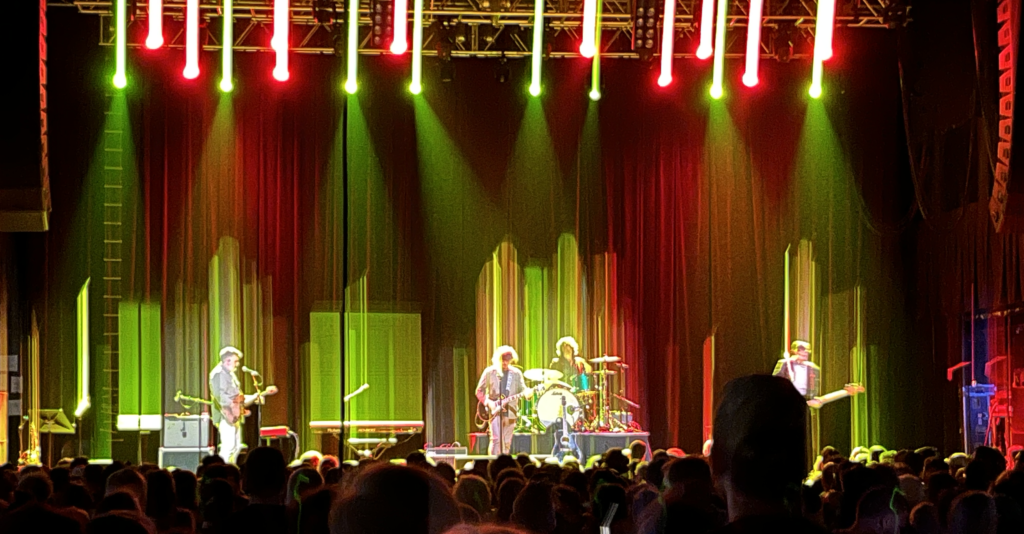by Ben Bonadies

The Mountain Goats at Citizens House of Blues
Why isn’t John Darnielle more famous? His band The Mountain Goats have been consistently releasing material since the early 90s, inking big-name indie record deals and recruiting a small army to his tribe all the while. Steven Colbert, John Green, Lin-Manuel Miranda, and Rian Johnson are fans and friends. They even had a viral hit with a dance and everything.
For the first ten years of their existence the Mountain Goats were exclusively a lo-fi enterprise: just Darnielle, his acoustic guitar, and a Panasonic RX-FT500 boom-box with recording functionality into which he sang beguilingly emotional and catchy folk tunes. Heavy tape hiss was part of the appeal. Following this period, and barring a few conceptual swings here and there, their sound drifted amiably between jangle pop, literary soft-rock, and ska-inflected indie. What this band will sound like on stage depends on when you see them.
It may sound crass but musicianship is mostly trivial to the Mountain Goats fan experience; Mountain Goats songs are often more about their lyrics than what’s playing behind them. Darnielle is a writer first and a rock star second. He’s published three works of fiction and notched himself a National Book Award nom for his debut novel. In fact, the first Mountain Goats song began its life as a poem that Darnielle married to a chord progression worked out on a $30 Hawaiian guitar. But as Bob Dylan will tell you, you can’t be a man with an acoustic guitar forever—though, like Dylan, Darnielle does make space for a few solo numbers to appease the diehards.
Cannily, Darnielle has surrounded himself with exactly the right players that give his songs the might they wield on the page. Their dynamite rhythm section is led by Jon Wurster, famed drummer of Superchunk and beloved fixture on “The Best Show,” who brings real rock n’ roll muscle to the kit. Peter Huges cooks up punk inflected bass lines that sing and slither through Darnielle’s strumming. It’s on this foundation that Matt Douglas can layer saxophone, keys, and additional guitar. God bless the multi-instrumentalist, for it is Douglas who allows the Goats to embody the different modes they can inhabit: marching band funk on “Foreign Object,” somber piano on “Wear Black,” and delicate riffage on “Incandescent Ruins.” This stop at Citizen’s House of Blues even included a special guest, Hughes’ cousin Kyle Leonard who joined on saxophone for “Picture of My Dress” (which features the best second verse in the Mountain Goats canon) and “Cry For Judas.” The Kyle Contingent as they came to be known were fierce in their devotion. Chants of “Ky-le!” broke out upon his triumphant return for “The Diaz Brothers.”
Darnielle is not eager to please but he is never boring. He mutates the meter fans know from the record to something resistant to singalongs (another pull from the Dylan bag of tricks). He paused seconds into “Source Decay,” the closest thing his masterwork “All Hail West Texas” has to a title track, to stop himself before he did something cheeky. “What if I said ‘Boston post office box?’ What if I was the kind of person who did that?” But then, after starting the song again in earnest, he changed the lyric to “Somerville” to a round of whoops from the crowd. This knowing playfulness is key to what makes Darnielle a compelling rock frontman. He radiates humility (he polled the audience for the lyrics to “The Recognition Scene”) and is happy to shine his light on the people sharing the stage with him, but is not above some light shit-talking. “Which bands are posers?” he asked near the end of the night. “I like some of ‘em, but all the other ones.”
It may surprise fans to learn that Darnielle is an avowed Deadhead, though the good ol’ Grateful Dead make an excellent template for the Goats to follow. Though Darnielle is no Jerry Garcia (his closest analogue would be Dead lyricist and songwriter Robert Hunter) he is a capable improviser. He started on piano and he is noticeably more comfortable and confident there than on his guitar, but the band has begun to sow the seeds of exploratory live sets. Their setlists are rarely locked in and are not shy about extending their vibier songs to near-jam levels. “I’m an amateur soloist,” he said after a workmanlike but lyrical turn on “Tidal Wave.” “Come see me in ten years, I’ll have it.” I will, John.
